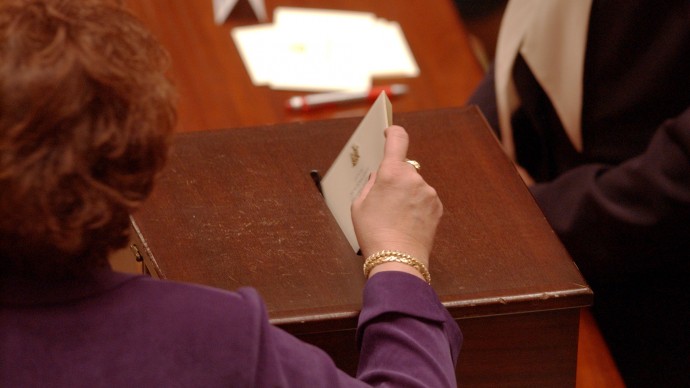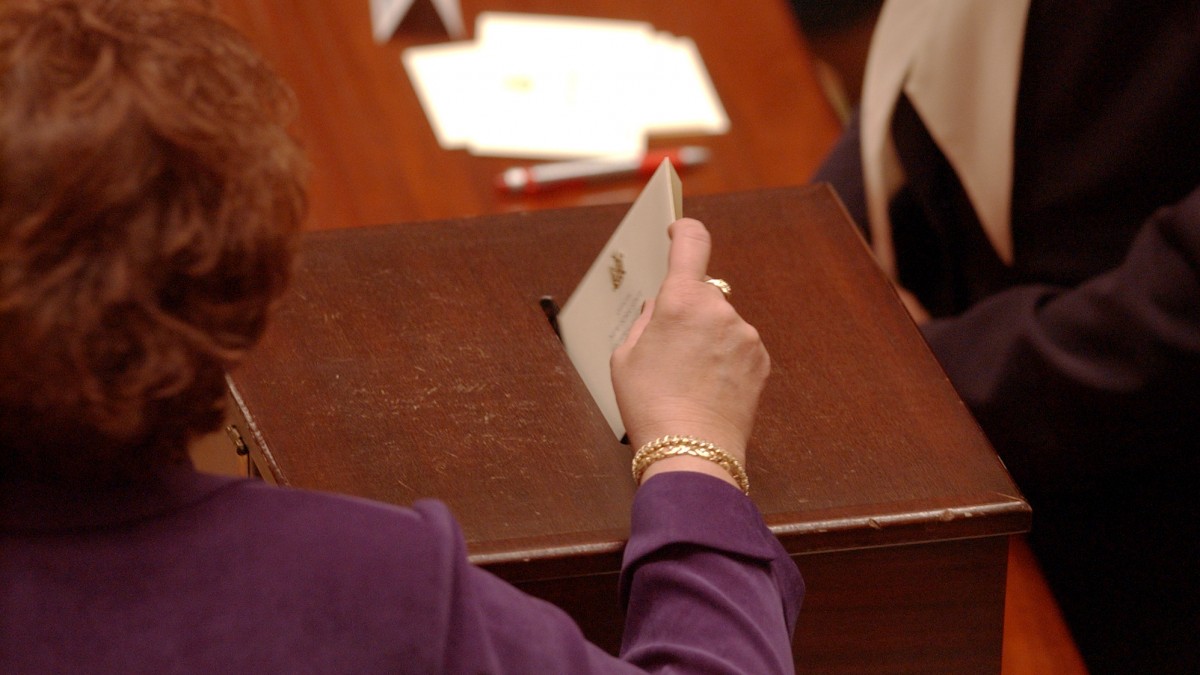
(MintPress) – You can generally stir up a solid debate when asking someone whether or not they feel their vote matters during a presidential election. More often than not, criticism ultimately becomes rooted in the Electoral College – a multifaceted system in which states hold presidential elections and submit state-allotted voters based on their number of electors. The system has been in place since the Founding Fathers, but has faced mounting criticism over past presidential candidates who won the popular vote across the country but not the presidential election.
To fully understand the criticism and support of the Electoral College, you have to understand its functionality. Next Tuesday, when voters head to the polls to cast their selection for the next president, it will not be in the totality of a national election. In America’s political system, a national election would suggest that the winner of the popular vote would become president. Rather, state elections determine how voters will be weighed during national counting.
States are given “elector” voters based on the number of senators and members in the House of Representatives each respective states has, for a total of 538. Since state representatives are based on state populations, highly populated states receive more Electoral College votes than more sparsely populated states. With that, California leads the country with 55 electors; states such as South Dakota and Montana are given three.
In December, the month following the election, electors meet in their state to formally cast their votes for president and vice president. In some states, electors are required to follow the lead of the popular vote. In Nebraska, for example, the state popular vote is divided among the elector votes – if a candidate receives 50 percent of the state vote, half of the elector votes would go to that candidate.
For many voters in America, the entirety of the system is a complicated conundrum that they would like to see abolished. After the 2000 presidential election, in which Democratic presidential candidate Al Gore won the popular vote over Republican George W. Bush, but lost the Electoral College vote, citizens piled on in criticism of the system. In a Gallup poll conducted last fall, 62 percent of Americans said they would like to see the Constitution amended to allow for election reforms. That figure has remained consistent since 2000, when 61 percent said the system need to change.
«Americans show relatively little attachment to this unique invention of the country’s Founding Fathers,» Gallup’s Lydia Saad said. «Those who advocate abolishing the Electoral College often do so on the basis that the system puts undue emphasis on a small number of swing states.»
The case for the Electoral College
Proponents for the current Electoral College say it provides balance to campaigns, rather than candidates simply going to the most populated areas in the country. They also say it benefits minority groups because their increased population in the country means candidates simply cannot dismiss them in a state that does not have a higher population. Former Federal Election Commission official William Kimberling said minorities may actually play a more crucial role in an Electoral College system rather than a popular vote system.
“This is so because the votes of even small minorities in a State may make the difference between winning all of that State’s electoral votes or none of that State’s electoral votes,” Kimberling wrote. “And since ethnic minority groups in the United States happen to concentrate in those States with the most electoral votes, they assume an importance to presidential candidates well out of proportion to their number. The same principle applies to other special interest groups such as labor unions, farmers, environmentalists, and so forth.”
Another one of the few arguments made for the current system is that it isolates election problems to the states, rather than an entire country facing a recount. In 2000, ballots in Florida were lost, found, recounted numerous times and eventually went to the Supreme Court. With suspicions of voter fraud seemingly escalating with every current election, whether legitimate or not, Cornell University professor Richard Darlington says it is more efficient to have states deal with the matter rather than it becoming a national dilemma.
Darlington argues that there are no feasible alternatives to the Electoral College that do not create a nationalized burden if fraud is suspected. With voter fraud being thrust into the spotlight as a political issue, elections would never get off the ground because they could theoretically get tied up in the court system for an extended period of time.
“One of the remarkable features of our present system for choosing a president is that the federal government has virtually no control over the system. If a sitting president chose to «postpone» the next election because of a war or social turmoil, he might succeed under a nationalized system,” Darlington wrote. “But under the present system his opinion would have little effect … This scenario is not as outrageous as some may think; during Richard Nixon’s first term as president, some liberals seriously suspected that Nixon was thinking about using the turmoil of those times as an excuse to ‘postpone’ the 1972 election.”
Detractors call for reform
There seem to be far more detractors of the Electoral College than those showing support for it. For Stanford Pulitzer Prize winning historian Jack Rakove, there are two main flaws of the system. One is that it weighs votes differently because the use of two senators in each state represents a distortion of power based on population. To apply that to an election, the value of a vote in a state with 500,000 people would be more than a state with 1.5 million people. Rakove says that goes against the one person, one vote rule because not all votes are then created equal.
His second quarrel goes against the point made by Kimberling in that Rakove says swing states ultimately control the election and that candidates focus too much of their attention on a state or region. In this year’s elections, Ohio, Colorado and Wisconsin see a high volume of candidate appearances because their electorate is often cited as being too close to call. Rakove says the playing field could become even if a nationalized election with a popular vote were implemented, causing a leveling of the playing field.
“This problem would disappear if we had a truly national election with one electorate and votes counting the same wherever they were cast,” he said. “Then the candidates would have to think more creatively about how to mobilize a national electorate, rather than pouring money into the televised advertisements that must drive voters in the battleground states completely bonkers. The parties would have the incentive to attract voters throughout the country, which is now a matter of complete indifference to them.”
The example pointed to most often by critics is the notion that a candidate can win the popular vote and not the presidency because of the allotted Electoral College votes. It has played out only a handful of times in history, first in 1876 when Samuel Tilden outpolled Electoral College winner Rutherford B. Hayes and most recently in 2000 during the Bush/Gore election. University of Houston associate political science professor Brandon Rottinghaus said that talk of the relevance of the Electoral College entered new heights after 2000.
“Usually the popular vote does correspond to the Electoral College, but in very rare cases, it may not,” Rottinghaus said. “The 2000 election was a very notable case, and it drew national attention to the Electoral College and the American electoral system.”
Arguably the most serious push toward election reform has come from American University’s Commission on Federal Election Reform, which has former United States President Jimmy Carter as one of its co-chairs. The commission has proposed 87 different changes to the current election system, from operations of polling stations to identification rules. The group did not propose the elimination of the Electoral College, but noted that separating the election process from those already involved in politics is crucial because the Electoral College is already made up of those with a partisan agenda.
“We recommend strengthening and restructuring the system by which elections have been administered in our country,” the commission said. “We propose that the EAC (Electronic Assistance Commission) and state election management bodies be reconstituted on a nonpartisan basis to become more independent and effective. We cannot build confidence in elections if secretaries of state responsible for certifying votes are simultaneously chairing political campaigns.”


